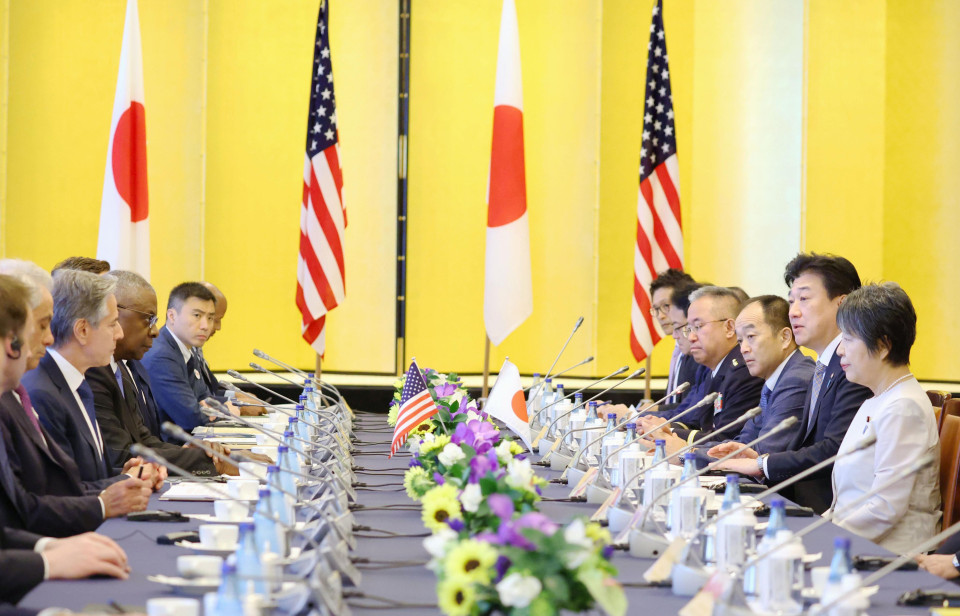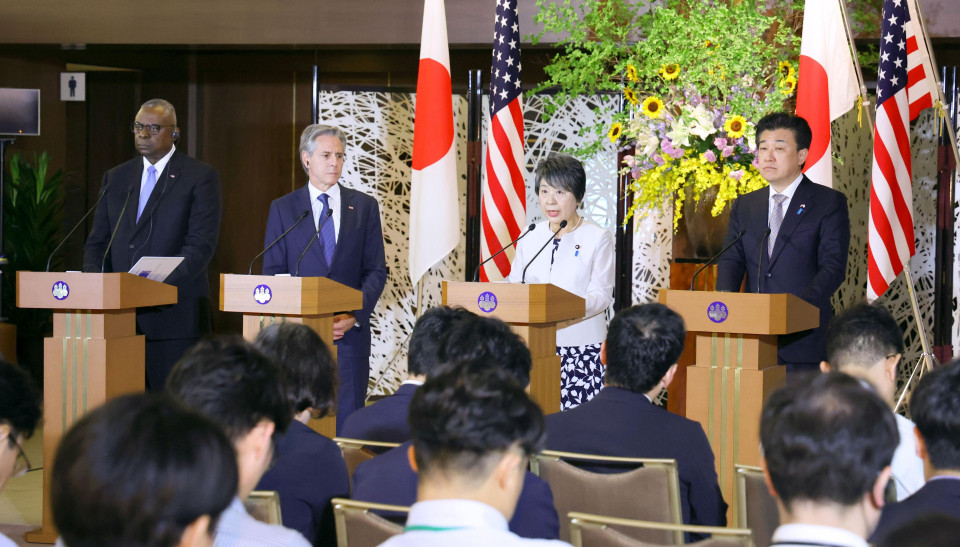Japan and the United States agreed Sunday to upgrade the command functions of the U.S. forces in Japan for better coordination of their bilateral alliance amid China's assertiveness in the region and the North Korean nuclear threat, while pursuing expanded coproduction of air defense missiles.
The foreign and defense ministers of the two countries also vowed to explore ways to strengthen so-called extended deterrence, which includes U.S. nuclear protection provided to Japan, in their first-ever ministerial talks on the issue that followed the "two-plus-two" security talks in Tokyo.
At the outset of the security meeting, Japanese Foreign Minister Yoko Kamikawa said the two countries "must consistently beef up the alliance and enhance deterrence" to defend the existing international order. U.S. Secretary of Defense Lloyd Austin said the move to modernize their command and control structures is "one of the most significant developments in the history of our alliance."

The two-plus-two talks, also joined by Japanese Defense Minister Minoru Kihara and U.S. Secretary of State Antony Blinken, were the first such meeting since January 2023 and showcased the close ties between the two allies following U.S. President Joe Biden's withdrawal from the presidential race in November.
In a statement issued after the meeting, the four ministers cautioned that Beijing "seeks to reshape the international order for its own benefit at the expense of others" and called its coercive behavior a "serious concern" to the alliance.
Against the backdrop of the evolving security environment, the statement stipulated that the United States "intends to reconstitute U.S. Forces Japan as a joint force headquarters" to "facilitate deeper interoperability and cooperation on joint bilateral operations (with Japan) in peacetime and during contingencies."
The reconstituted USFJ is expected to serve as an important counterpart of the Japanese Self-Defense Forces' joint operation headquarters that will be launched by March 2025 to unify the command of its ground, maritime and air services, it said.

Currently, roles of USFJ headquarters have been largely limited to the management of military bases in the Asian nation, which hosts some 54,000 American troops. The U.S. Indo-Pacific Command, based in Hawaii, meanwhile, has authority over forces assigned to its vast area of responsibility that includes Japan.
Different time zones and physical distance have been seen as hampering the efficient interaction of the SDF and the U.S. military, prompting calls to upgrade the functions of the USFJ, headquartered at Yokota Air Base in the suburbs of Tokyo.
Austin told a joint press conference with the three other ministers that USFJ will be upgraded "with expanded missions and operational responsibilities."
Asked by a reporter about the possible impact of the U.S. presidential election, where Donald Trump pursuing his "America First" agenda could make a comeback, Blinken said the strengthened alliance "will be sustained irrespective of the outcome" of the race.
Tokyo and Washington will also explore opportunities to bolster production capacity of the Patriot Advanced Capability-3 ground-based interceptor missiles and medium-range air-to-air missiles known as AMRAAM, both developed in the United States, according to the statement.
The move follows Japan's recent relaxation of its weapons transfer rules to facilitate arms exports, amid a U.S. missile stockpile shortage as Washington continues to supply Ukraine with weapons to push back against Russia's aggression.
The Japanese and U.S. ministers also stressed the "critical importance of continuing to enhance U.S. extended deterrence," referring to the U.S. commitment to deploy its nuclear and conventional forces to deter attacks on allies.
A separate statement issued in the wake of the extended deterrence ministerial meeting touched on China's "accelerating and opaque expansion of its nuclear arsenal," and Russia's "undermining of arms control and the global nonproliferation regime, including through its expanding military cooperation and unlawful arms transfers with North Korea."
On Taiwan, a self-ruled democratic island that Beijing views as its own territory, Japan and the United States reiterated the importance of maintaining peace and stability across the Taiwan Strait.
They also said Taiwan's political transition "should not be used as a pretext for provocative actions," in a veiled reference to a large-scale Chinese military drill surrounding the island that took place after Taiwanese President Lai Ching-te's inauguration in May.
Discussions on upgrading the alliance's command and control frameworks as well as on extended deterrence were both issues Japanese Prime Minister Fumio Kishida and U.S. President Joe Biden, when they met in April, tasked their ministers to deal with at the two-plus-two talks.
Tokyo and Washington have held senior-level discussions on extended deterrence. But some lawmakers from Japan's ruling Liberal Democratic Party have called for an upgrade to the dialogue, established in 2010, as concerns grow over Russia's threats to use nuclear weapons following its invasion of Ukraine in 2022.
Following recent revelations of sexual assault cases involving U.S. servicemen in the southern island prefecture of Okinawa, which hosts the bulk of U.S. military installations in Japan, the two countries underscored "the importance of continued bilateral coordination for sharing timely information on incidents and accidents."
They also confirmed the relocation of U.S. Marines from Okinawa to Guam will begin this year as planned, a move that comes as part of a long-agreed Japan-U.S. forces realignment plan aimed at reducing Okinawa's base-hosting burden.
Related coverage:
Japan, U.S, South Korea sign document to cement security cooperation
U.S., China top diplomats spar over Taiwan, S. China Sea
Biden vows to boost ties with Asian allies in remainder of his term
 By Keita Nakamura,
By Keita Nakamura,









